Walbank F.W., Astin A.E., Frederiksen M.W., Ogilvie R.M. The Cambridge Ancient History, Volume 7, Part 1: The Hellenistic World
Подождите немного. Документ загружается.

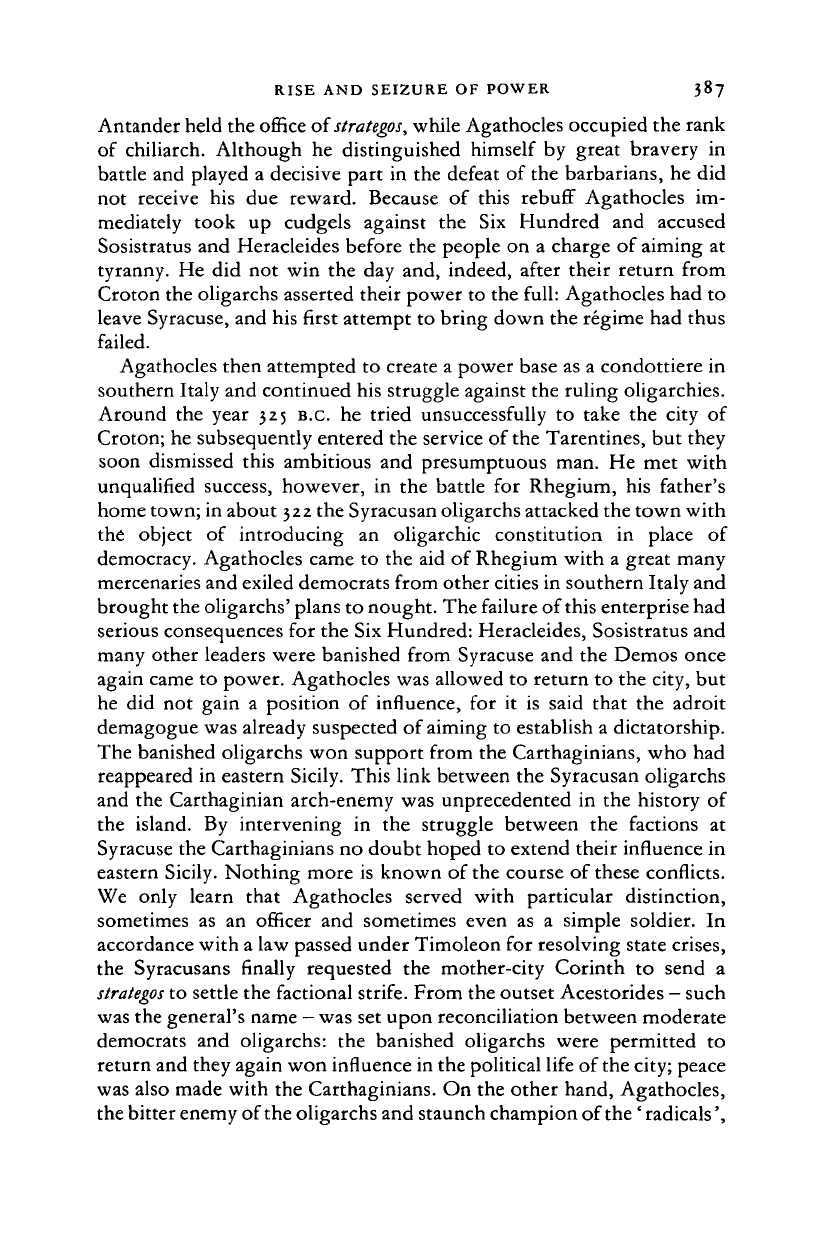
RISE AND SEIZURE OF POWER 387
Antander held the office
oistrategos,
while Agathocles occupied the rank
of chiliarch. Although he distinguished himself by great bravery in
battle and played a decisive part in the defeat of the barbarians, he did
not receive his due reward. Because of this rebuff Agathocles im-
mediately took up cudgels against the Six Hundred and accused
Sosistratus and Heracleides before the people on a charge of aiming at
tyranny. He did not win the day and, indeed, after their return from
Croton the oligarchs asserted their power to the full: Agathocles had to
leave Syracuse, and his first attempt to bring down the regime had thus
failed.
Agathocles then attempted to create a power base as a condottiere in
southern Italy and continued his struggle against the ruling oligarchies.
Around the year 325
B.C.
he tried unsuccessfully to take the city of
Croton; he subsequently entered the service of the Tarentines, but they
soon dismissed this ambitious and presumptuous man. He met with
unqualified success, however, in the battle for Rhegium, his father's
home town; in about 322 the Syracusan oligarchs attacked the town with
the object of introducing an oligarchic constitution in place of
democracy. Agathocles came to the aid of Rhegium with a great many
mercenaries and exiled democrats from other cities in southern Italy and
brought the oligarchs' plans to nought. The failure of this enterprise had
serious consequences for the Six Hundred: Heracleides, Sosistratus and
many other leaders were banished from Syracuse and the Demos once
again came to power. Agathocles was allowed to return to the city, but
he did not gain a position of influence, for it is said that the adroit
demagogue was already suspected of aiming to establish a dictatorship.
The banished oligarchs won support from the Carthaginians, who had
reappeared in eastern Sicily. This link between the Syracusan oligarchs
and the Carthaginian arch-enemy was unprecedented in the history of
the island. By intervening in the struggle between the factions at
Syracuse the Carthaginians no doubt hoped to extend their influence in
eastern Sicily. Nothing more is known of the course of these conflicts.
We only learn that Agathocles served with particular distinction,
sometimes as an officer and sometimes even as a simple soldier. In
accordance with a law passed under Timoleon for resolving state crises,
the Syracusans finally requested the mother-city Corinth to send a
strategos
to settle the factional strife. From the outset Acestorides - such
was the general's name
—
was set upon reconciliation between moderate
democrats and oligarchs: the banished oligarchs were permitted to
return and they again won influence in the political life of
the
city; peace
was also made with the Carthaginians. On the other hand, Agathocles,
the bitter enemy of the oligarchs and staunch champion of
the'
radicals',
Cambridge Histories Online © Cambridge University Press, 2008
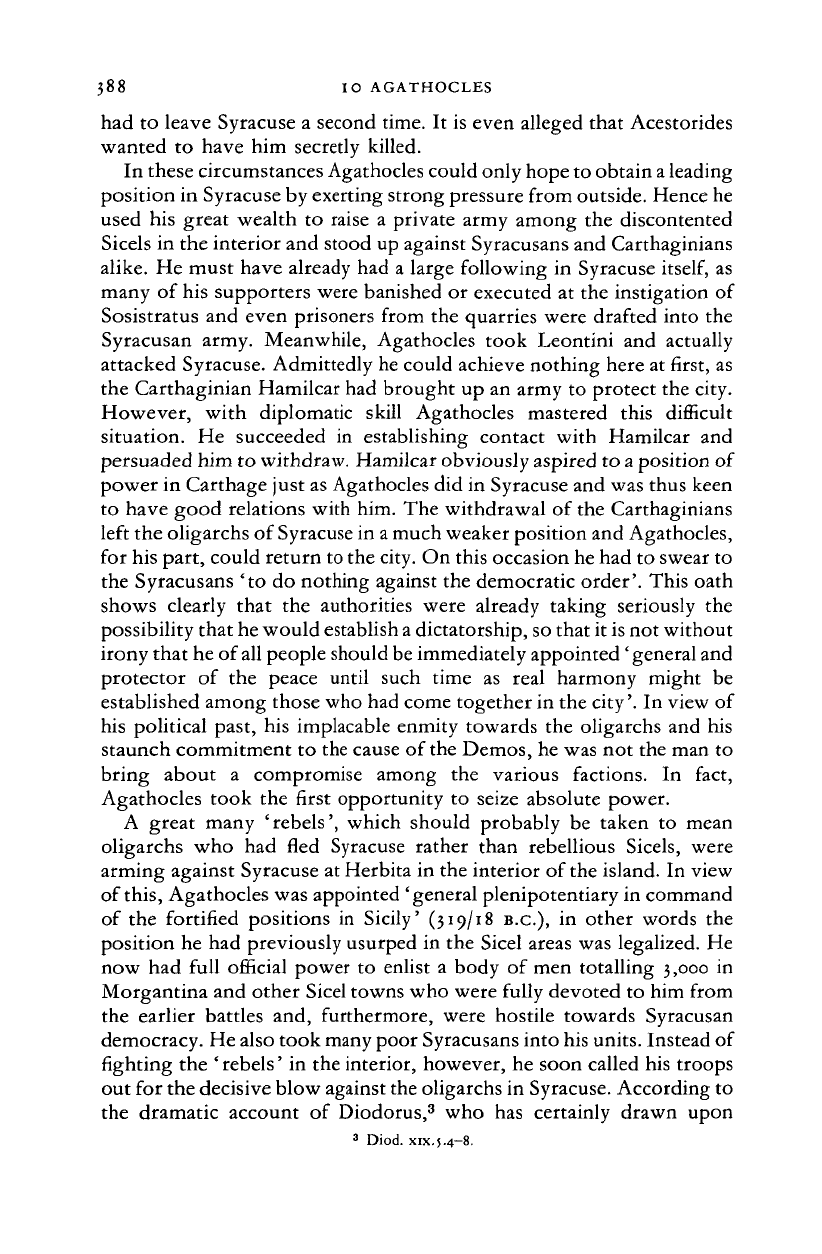
388 IO
AGATHOCLES
had to leave Syracuse a second time. It is even alleged that Acestorides
wanted to have him secretly killed.
In these circumstances Agathocles could only hope to obtain
a
leading
position in Syracuse by exerting strong pressure from outside. Hence he
used his great wealth to raise a private army among the discontented
Sicels in the interior and stood up against Syracusans and Carthaginians
alike. He must have already had a large following in Syracuse
itself,
as
many of his supporters were banished or executed at the instigation of
Sosistratus and even prisoners from the quarries were drafted into the
Syracusan army. Meanwhile, Agathocles took Leontini and actually
attacked Syracuse. Admittedly he could achieve nothing here at first, as
the Carthaginian Hamilcar had brought up an army to protect the city.
However, with diplomatic skill Agathocles mastered this difficult
situation. He succeeded in establishing contact with Hamilcar and
persuaded him to withdraw. Hamilcar obviously aspired to a position of
power in Carthage just as Agathocles did in Syracuse and was thus keen
to have good relations with him. The withdrawal of the Carthaginians
left the oligarchs of Syracuse in
a
much weaker position and Agathocles,
for his part, could return to the city. On this occasion he had to swear to
the Syracusans 'to do nothing against the democratic order'. This oath
shows clearly that the authorities were already taking seriously the
possibility that he would establish
a
dictatorship, so that it is not without
irony that he of all people should be immediately appointed ' general and
protector of the peace until such time as real harmony might be
established among those who had come together in the city'. In view of
his political past, his implacable enmity towards the oligarchs and his
staunch commitment to the cause of the Demos, he was not the man to
bring about a compromise among the various factions. In fact,
Agathocles took the first opportunity to seize absolute power.
A great many 'rebels', which should probably be taken to mean
oligarchs who had fled Syracuse rather than rebellious Sicels, were
arming against Syracuse at Herbita in the interior of the island. In view
of
this,
Agathocles was appointed 'general plenipotentiary in command
of the fortified positions in Sicily' (319/18 B.C.), in other words the
position he had previously usurped in the Sicel areas was legalized. He
now had full official power to enlist a body of men totalling 3,000 in
Morgantina and other Sicel towns who were fully devoted to him from
the earlier battles and, furthermore, were hostile towards Syracusan
democracy. He also took many poor Syracusans into his units. Instead of
fighting the ' rebels' in the interior, however, he soon called his troops
out for the decisive blow against the oligarchs in Syracuse. According to
the dramatic account of Diodorus,
3
who has certainly drawn upon
3
Diod. xix.5.4—8.
Cambridge Histories Online © Cambridge University Press, 2008
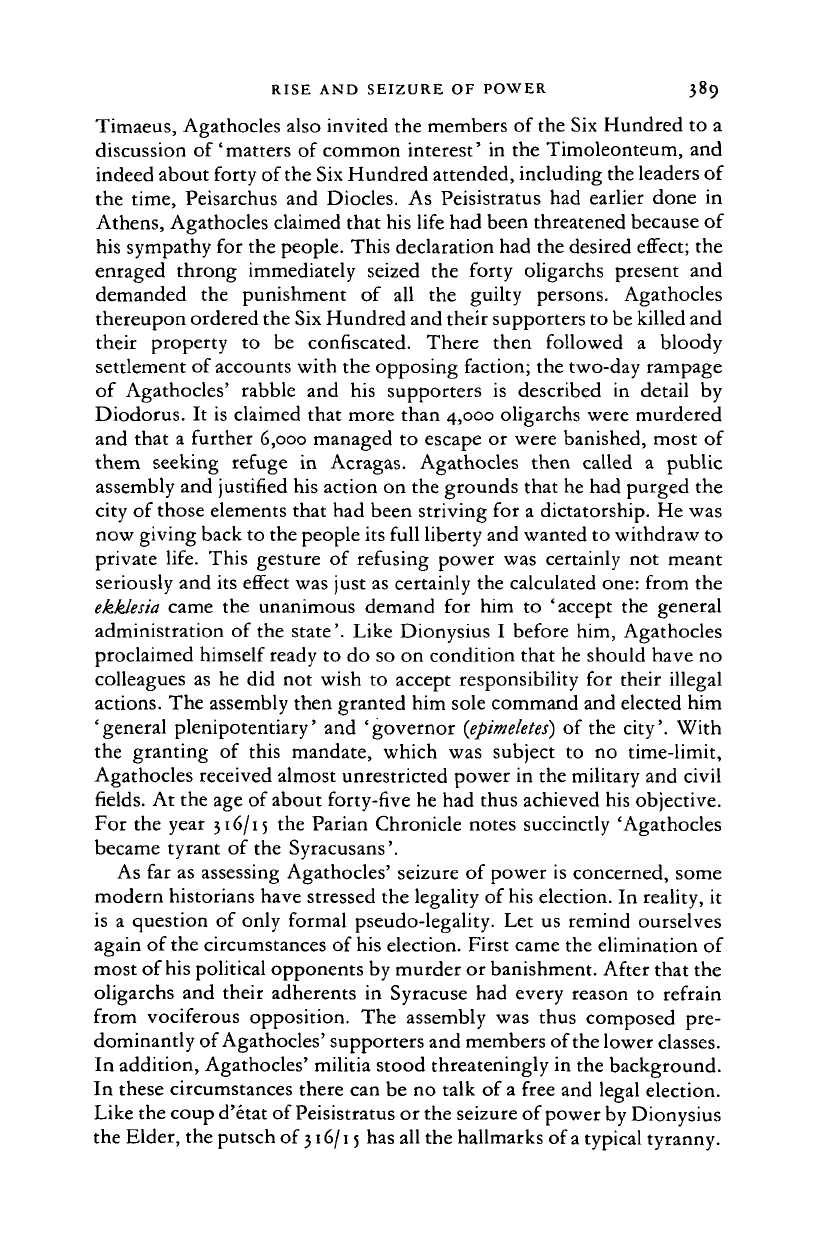
RISE AND SEIZURE OF POWER 389
Timaeus, Agathocles also invited the members of the Six Hundred to a
discussion of'matters of common interest' in the Timoleonteum, and
indeed about forty of
the
Six Hundred attended, including the leaders of
the time, Peisarchus and Diodes. As Peisistratus had earlier done in
Athens, Agathocles claimed that his life had been threatened because of
his sympathy for the people. This declaration had the desired effect; the
enraged throng immediately seized the forty oligarchs present and
demanded the punishment of all the guilty persons. Agathocles
thereupon ordered the Six Hundred and their supporters to be killed and
their property to be confiscated. There then followed a bloody
settlement of accounts with the opposing faction; the two-day rampage
of Agathocles' rabble and his supporters is described in detail by
Diodorus. It is claimed that more than 4,000 oligarchs were murdered
and that a further 6,000 managed to escape or were banished, most of
them seeking refuge in Acragas. Agathocles then called a public
assembly and justified his action on the grounds that he had purged the
city of those elements that had been striving for a dictatorship. He was
now giving back to the people its full liberty and wanted to withdraw to
private life. This gesture of refusing power was certainly not meant
seriously and its effect was just as certainly the calculated one: from the
ekklesia
came the unanimous demand for him to 'accept the general
administration of the state'. Like Dionysius I before him, Agathocles
proclaimed himself ready to do so on condition that he should have no
colleagues as he did not wish to accept responsibility for their illegal
actions. The assembly then granted him sole command and elected him
'general plenipotentiary' and 'governor
(epimeletes)
of the city'. With
the granting of this mandate, which was subject to no time-limit,
Agathocles received almost unrestricted power in the military and civil
fields. At the age of about forty-five he had thus achieved his objective.
For the year 316/15 the Parian Chronicle notes succinctly 'Agathocles
became tyrant of the Syracusans'.
As far as assessing Agathocles' seizure of power is concerned, some
modern historians have stressed the legality of his election. In reality, it
is a question of only formal pseudo-legality. Let us remind ourselves
again of the circumstances of his election. First came the elimination of
most of
his
political opponents by murder or banishment. After that the
oligarchs and their adherents in Syracuse had every reason to refrain
from vociferous opposition. The assembly was thus composed pre-
dominantly of Agathocles' supporters and members of the lower classes.
In addition, Agathocles' militia stood threateningly in the background.
In these circumstances there can be no talk of a free and legal election.
Like the coup d'etat of Peisistratus or the seizure of power by Dionysius
the Elder, the putsch of
316/15
has all the hallmarks of a typical tyranny.
Cambridge Histories Online © Cambridge University Press, 2008
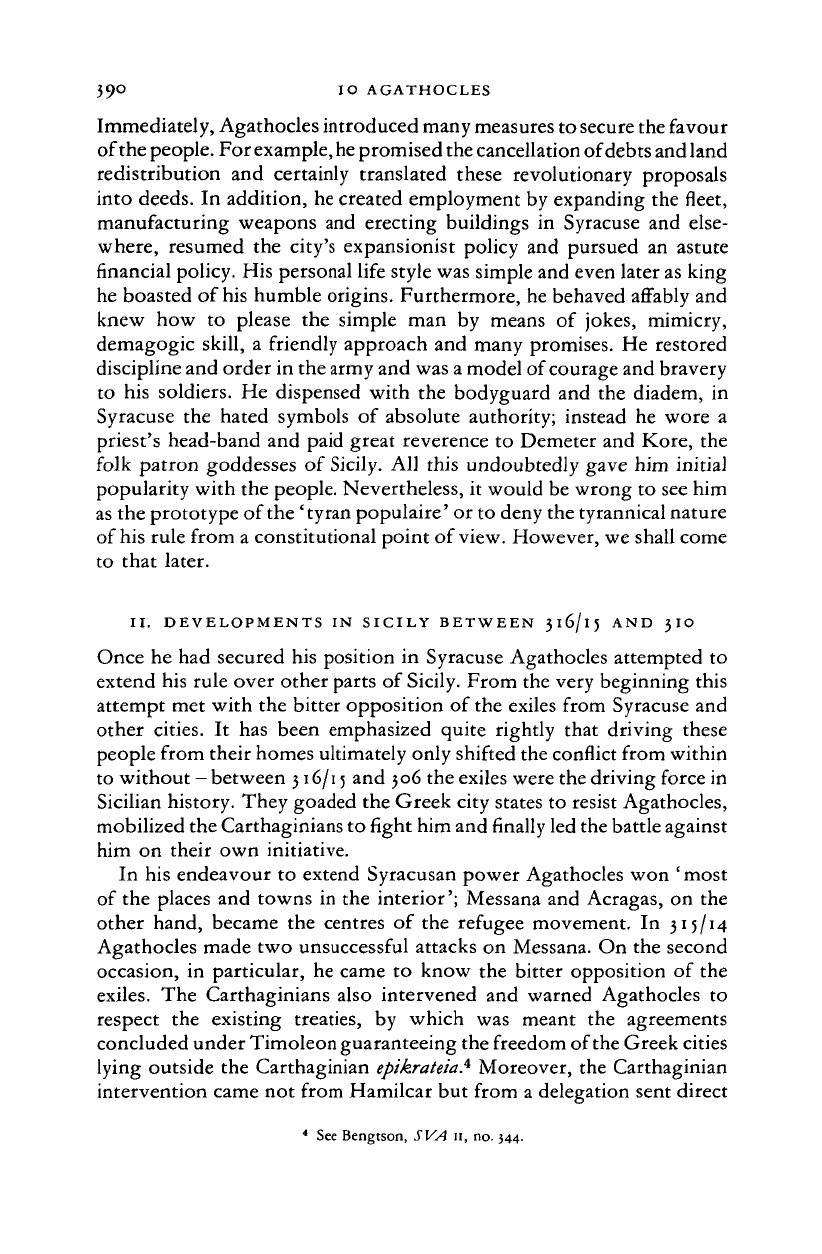
39° 1°
AGATHOCLES
Immediately, Agathocles introduced many measures to secure the favour
of the
people.
For
example,
he
promised the cancellation of debts and land
redistribution and certainly translated these revolutionary proposals
into deeds. In addition, he created employment by expanding the fleet,
manufacturing weapons and erecting buildings in Syracuse and else-
where, resumed the city's expansionist policy and pursued an astute
financial policy. His personal life style was simple and even later as king
he boasted of his humble origins. Furthermore, he behaved affably and
knew how to please the simple man by means of jokes, mimicry,
demagogic skill, a friendly approach and many promises. He restored
discipline and order in the army and was a model of courage and bravery
to his soldiers. He dispensed with the bodyguard and the diadem, in
Syracuse the hated symbols of absolute authority; instead he wore a
priest's head-band and paid great reverence to Demeter and Kore, the
folk patron goddesses of Sicily. All this undoubtedly gave him initial
popularity with the people. Nevertheless, it would be wrong to see him
as the prototype of the 'tyran populaire' or to deny the tyrannical nature
of
his
rule from a constitutional point of
view.
However, we shall come
to that later.
II.
DEVELOPMENTS IN SICILY BETWEEN 316/1
5
AND 3IO
Once he had secured his position in Syracuse Agathocles attempted to
extend his rule over other parts of Sicily. From the very beginning this
attempt met with the bitter opposition of the exiles from Syracuse and
other cities. It has been emphasized quite rightly that driving these
people from their homes ultimately only shifted the conflict from within
to without
—
between 316/15 and 306 the exiles were the driving force in
Sicilian history. They goaded the Greek city states to resist Agathocles,
mobilized the Carthaginians to fight him and
finally
led the battle against
him on their own initiative.
In his endeavour to extend Syracusan power Agathocles won 'most
of the places and towns in the interior'; Messana and Acragas, on the
other hand, became the centres of the refugee movement. In 315/14
Agathocles made two unsuccessful attacks on Messana. On the second
occasion, in particular, he came to know the bitter opposition of the
exiles.
The Carthaginians also intervened and warned Agathocles to
respect the existing treaties, by which was meant the agreements
concluded under Timoleon guaranteeing the freedom of the Greek cities
lying outside the Carthaginian
epikrateia*
Moreover, the Carthaginian
intervention came not from Hamilcar but from a delegation sent direct
* See Bengtson, SVA 11, no. 344.
Cambridge Histories Online © Cambridge University Press, 2008
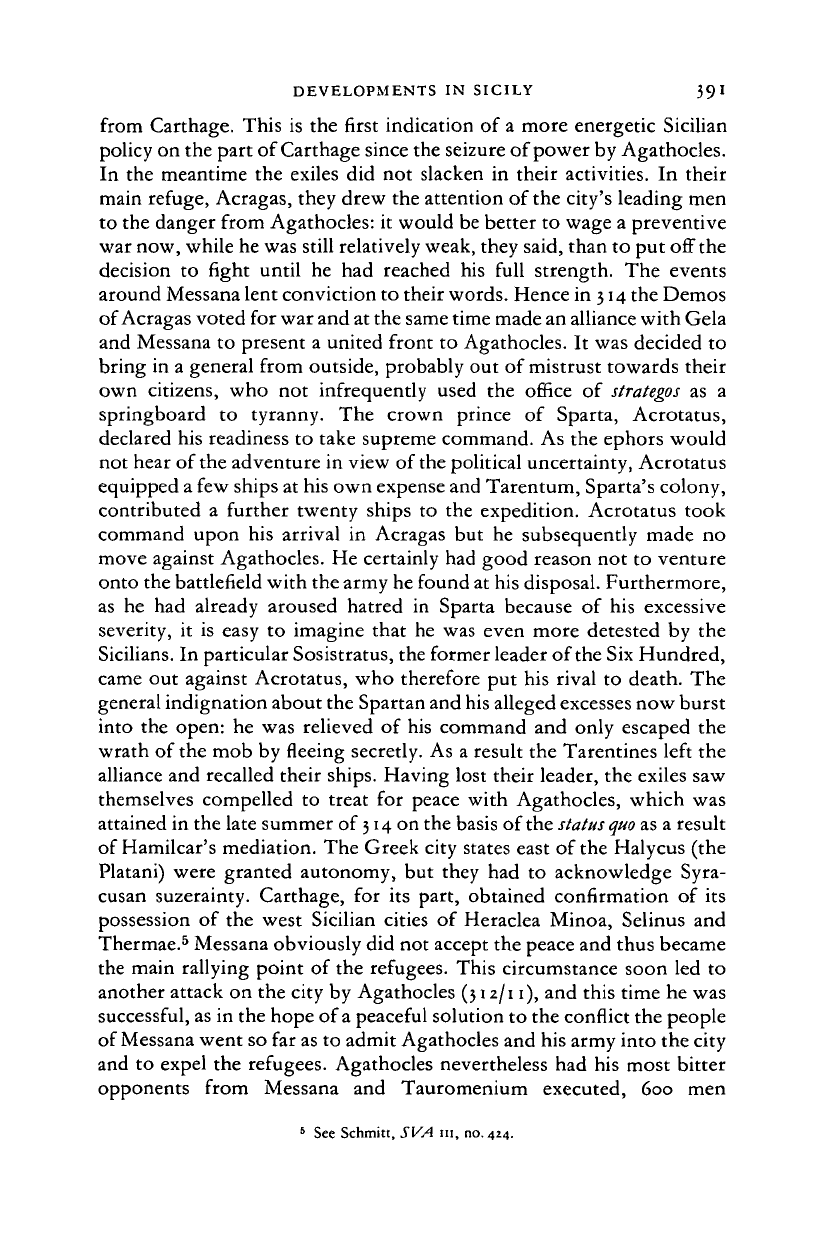
DEVELOPMENTS IN SICILY 39 I
from Carthage. This is the first indication of a more energetic Sicilian
policy on the part of Carthage since the seizure of power by Agathocles.
In the meantime the exiles did not slacken in their activities. In their
main refuge, Acragas, they drew the attention of the city's leading men
to the danger from Agathocles: it would be better to wage a preventive
war now, while he was still relatively weak, they said, than to put off the
decision to fight until he had reached his full strength. The events
around Messana lent conviction to their words. Hence in 314 the Demos
of Acragas voted for war and at the same time made an alliance with Gela
and Messana to present a united front to Agathocles. It was decided to
bring in a general from outside, probably out of mistrust towards their
own citizens, who not infrequently used the office of
strategos
as a
springboard to tyranny. The crown prince of Sparta, Acrotatus,
declared his readiness to take supreme command. As the ephors would
not hear of the adventure in view of
the
political uncertainty, Acrotatus
equipped a few ships at his own expense and Tarentum, Sparta's colony,
contributed a further twenty ships to the expedition. Acrotatus took
command upon his arrival in Acragas but he subsequently made no
move against Agathocles. He certainly had good reason not to venture
onto the battlefield with the army he found at his disposal. Furthermore,
as he had already aroused hatred in Sparta because of his excessive
severity, it is easy to imagine that he was even more detested by the
Sicilians. In particular Sosistratus, the former leader of the Six Hundred,
came out against Acrotatus, who therefore put his rival to death. The
general indignation about the Spartan and his alleged excesses now burst
into the open: he was relieved of his command and only escaped the
wrath of the mob by fleeing secretly. As a result the Tarentines left the
alliance and recalled their ships. Having lost their leader, the exiles saw
themselves compelled to treat for peace with Agathocles, which was
attained in the late summer of
314
on the basis of the
status quo
as a result
of Hamilcar's mediation. The Greek city states east of the Halycus (the
Platani) were granted autonomy, but they had to acknowledge Syra-
cusan suzerainty. Carthage, for its part, obtained confirmation of its
possession of the west Sicilian cities of Heraclea Minoa, Selinus and
Thermae.
5
Messana obviously did not accept the peace and thus became
the main rallying point of the refugees. This circumstance soon led to
another attack on the city by Agathocles (312/11), and this time he was
successful, as in the hope of a peaceful solution to the conflict the people
of Messana went so far as to admit Agathocles and his army into the city
and to expel the refugees. Agathocles nevertheless had his most bitter
opponents from Messana and Tauromenium executed, 600 men
5
See Schmitt, SVA m, no. 424.
Cambridge Histories Online © Cambridge University Press, 2008
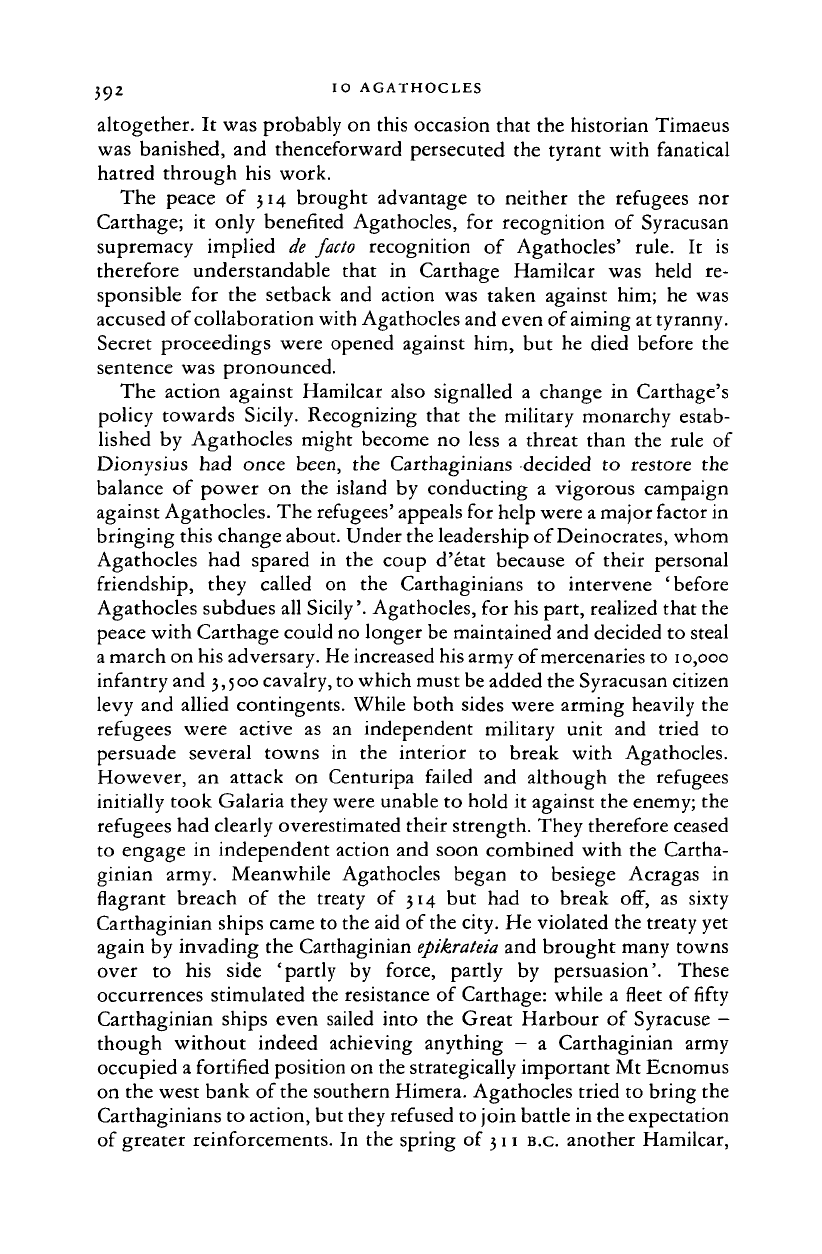
39
2
IO
AGATHOCLES
altogether. It was probably on this occasion that the historian Timaeus
was banished, and thenceforward persecuted the tyrant with fanatical
hatred through his work.
The peace of 314 brought advantage to neither the refugees nor
Carthage; it only benefited Agathocles, for recognition of Syracusan
supremacy implied de facto recognition of Agathocles' rule. It is
therefore understandable that in Carthage Hamilcar was held re-
sponsible for the setback and action was taken against him; he was
accused of collaboration with Agathocles and even of aiming at tyranny.
Secret proceedings were opened against him, but he died before the
sentence was pronounced.
The action against Hamilcar also signalled a change in Carthage's
policy towards Sicily. Recognizing that the military monarchy estab-
lished by Agathocles might become no less a threat than the rule of
Dionysius had once been, the Carthaginians decided to restore the
balance of power on the island by conducting a vigorous campaign
against Agathocles. The refugees' appeals for help were
a
major factor in
bringing this change about. Under the leadership of Deinocrates, whom
Agathocles had spared in the coup d'etat because of their personal
friendship, they called on the Carthaginians to intervene 'before
Agathocles subdues all Sicily'. Agathocles, for his part, realized that the
peace with Carthage could no longer be maintained and decided to steal
a
march on his adversary. He increased his army of mercenaries to 10,000
infantry and 3,500 cavalry, to which must be added the Syracusan citizen
levy and allied contingents. While both sides were arming heavily the
refugees were active as an independent military unit and tried to
persuade several towns in the interior to break with Agathocles.
However, an attack on Centuripa failed and although the refugees
initially took Galaria they were unable to hold it against the enemy; the
refugees had clearly overestimated their strength. They therefore ceased
to engage in independent action and soon combined with the Cartha-
ginian army. Meanwhile Agathocles began to besiege Acragas in
flagrant breach of the treaty of 314 but had to break off, as sixty
Carthaginian ships came to the aid of the city. He violated the treaty yet
again by invading the Carthaginian
epikrateia
and brought many towns
over to his side 'partly by force, partly by persuasion'. These
occurrences stimulated the resistance of Carthage: while a fleet of fifty
Carthaginian ships even sailed into the Great Harbour of Syracuse -
though without indeed achieving anything
—
a Carthaginian army
occupied a fortified position on the strategically important Mt Ecnomus
on the west bank of the southern Himera. Agathocles tried to bring the
Carthaginians to action, but they refused to join battle in the expectation
of greater reinforcements. In the spring of 311
B.C.
another Hamilcar,
Cambridge Histories Online © Cambridge University Press, 2008
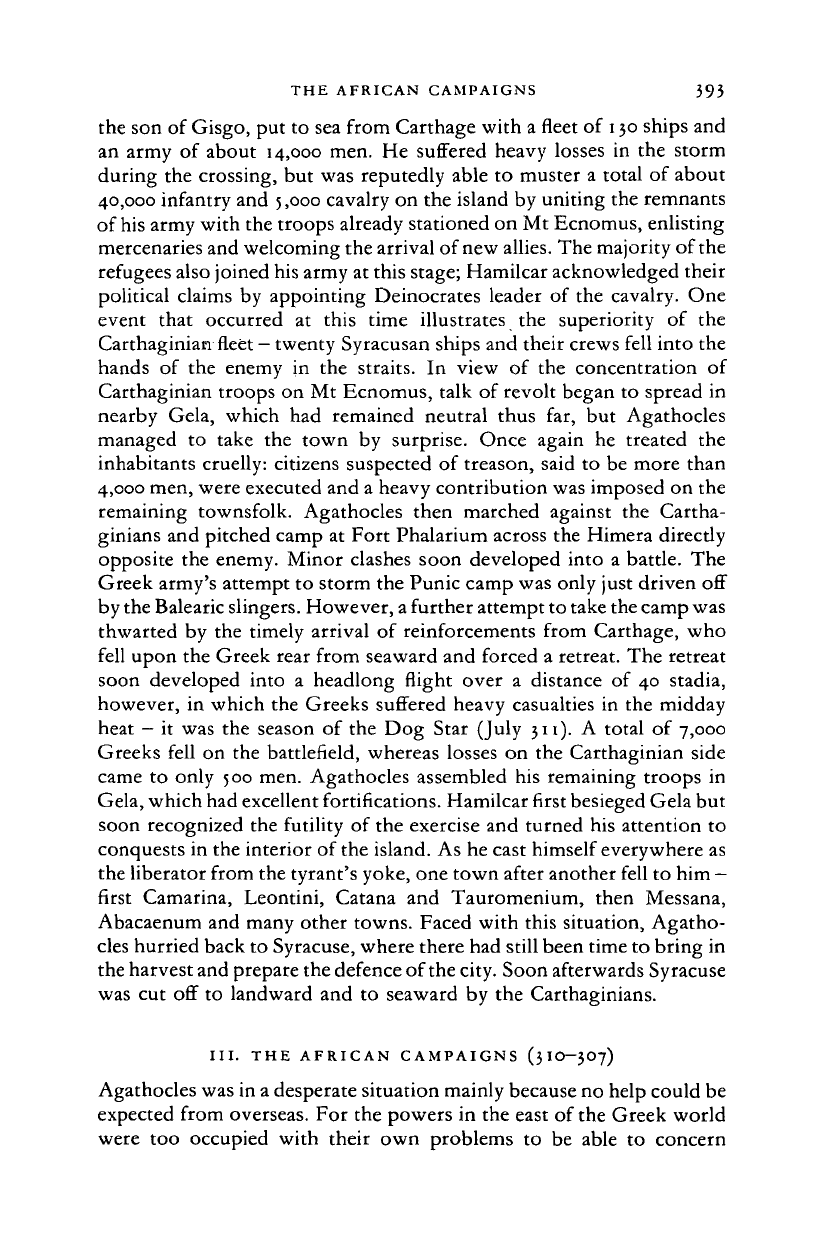
THE AFRICAN CAMPAIGNS
393
the
son of
Gisgo,
put to
sea from Carthage with
a
fleet
of
130 ships
and
an army
of
about 14,000
men. He
suffered heavy losses
in the
storm
during
the
crossing,
but was
reputedly able
to
muster
a
total
of
about
40,000 infantry
and
5,000
cavalry
on the
island
by
uniting
the
remnants
of
his
army with the troops already stationed
on
Mt Ecnomus, enlisting
mercenaries and welcoming the arrival
of
new
allies.
The majority of the
refugees also joined his army
at
this stage; Hamilcar acknowledged their
political claims
by
appointing Deinocrates leader
of the
cavalry.
One
event that occurred
at
this time illustrates
the
superiority
of the
Carthaginian fleet
—
twenty Syracusan ships and their crews fell into
the
hands
of the
enemy
in the
straits.
In
view
of the
concentration
of
Carthaginian troops
on Mt
Ecnomus, talk
of
revolt began
to
spread
in
nearby Gela, which
had
remained neutral thus
far, but
Agathocles
managed
to
take
the
town
by
surprise. Once again
he
treated
the
inhabitants cruelly: citizens suspected
of
treason, said
to be
more than
4,000 men, were executed and a heavy contribution was imposed
on the
remaining townsfolk. Agathocles then marched against
the
Cartha-
ginians and pitched camp
at
Fort Phalarium across
the
Himera direcdy
opposite
the
enemy. Minor clashes soon developed into
a
battle.
The
Greek army's attempt
to
storm
the
Punic camp was only just driven
off
by the Balearic slingers. However,
a
further attempt to take the camp was
thwarted
by the
timely arrival
of
reinforcements from Carthage,
who
fell upon
the
Greek rear from seaward
and
forced
a
retreat.
The
retreat
soon developed into
a
headlong flight over
a
distance
of 40
stadia,
however,
in
which
the
Greeks suffered heavy casualties
in the
midday
heat
- it was the
season
of the Dog
Star (July
311). A
total
of
7,000
Greeks fell
on the
battlefield, whereas losses
on the
Carthaginian side
came
to
only
500
men. Agathocles assembled
his
remaining troops
in
Gela, which had excellent fortifications. Hamilcar first besieged Gela but
soon recognized
the
futility
of
the exercise
and
turned
his
attention
to
conquests
in the
interior
of
the island.
As
he cast himself everywhere
as
the liberator from the tyrant's yoke, one town after another fell
to
him
-
first Camarina, Leontini, Catana
and
Tauromenium, then Messana,
Abacaenum
and
many other towns. Faced with this situation, Agatho-
cles hurried back
to
Syracuse, where there had still been time to bring
in
the harvest and prepare the defence of the city. Soon afterwards Syracuse
was
cut off to
landward
and to
seaward
by the
Carthaginians.
III.
THE AFRICAN CAMPAIGNS (3IO-3O7)
Agathocles was in a desperate situation mainly because no help could
be
expected from overseas.
For the
powers
in the
east
of
the Greek world
were
too
occupied with their
own
problems
to be
able
to
concern
Cambridge Histories Online © Cambridge University Press, 2008
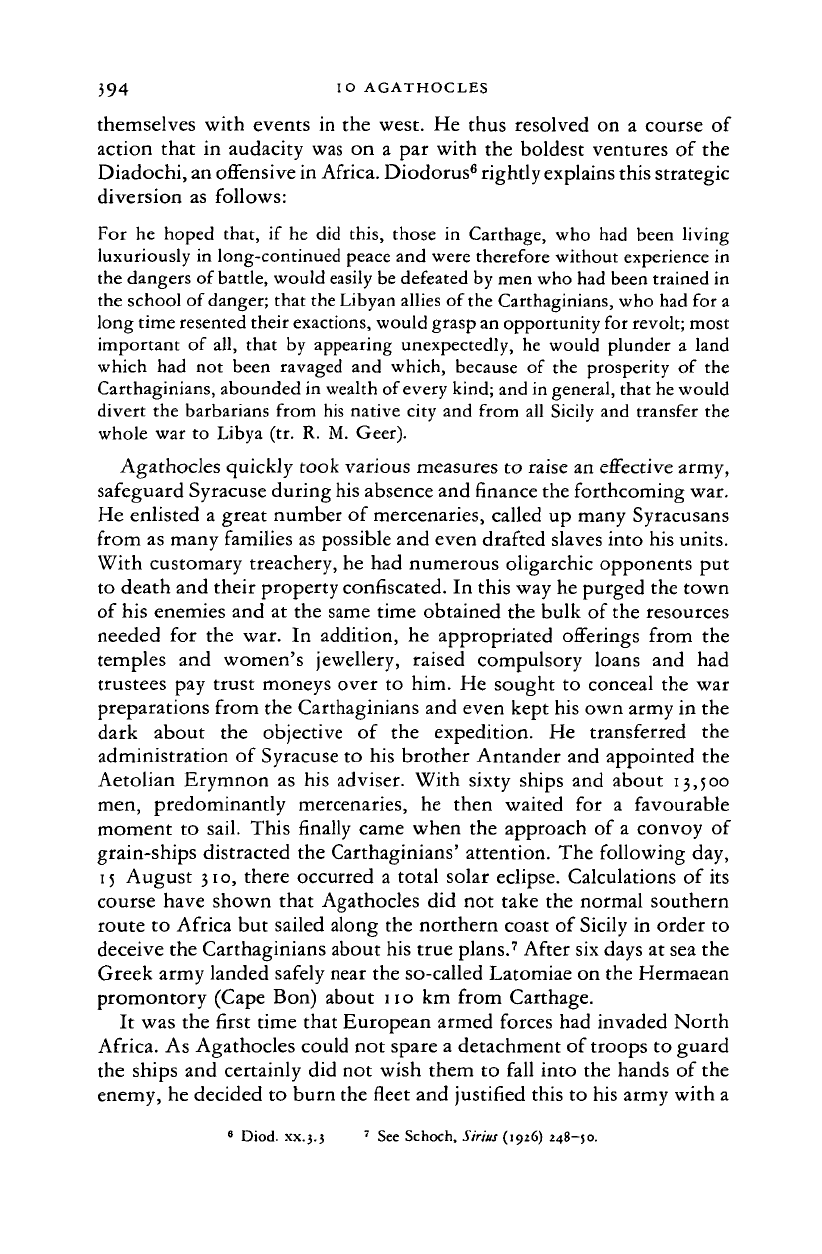
394 IO
AGATHOCLES
themselves with events in the west. He thus resolved on a course of
action that in audacity was on a par with the boldest ventures of the
Diadochi, an offensive in Africa. Diodorus
6
rightly explains this strategic
diversion as follows:
For he hoped that, if he did this, those in Carthage, who had been living
luxuriously in long-continued peace and were therefore without experience in
the dangers of
battle,
would easily
be
defeated by men who had been trained in
the school of
danger;
that the Libyan allies of
the
Carthaginians, who had for
a
long time resented their
exactions,
would grasp
an
opportunity for
revolt;
most
important of all, that by appearing unexpectedly, he would plunder a land
which had not been ravaged and which, because of the prosperity of the
Carthaginians, abounded in wealth of every kind; and in general, that
he
would
divert the barbarians from his native city and from all Sicily and transfer the
whole war to Libya (tr. R. M. Geer).
Agathocles quickly took various measures to raise an effective army,
safeguard Syracuse during his absence and finance the forthcoming war.
He enlisted a great number of mercenaries, called up many Syracusans
from as many families as possible and even drafted slaves into his units.
With customary treachery, he had numerous oligarchic opponents put
to death and their property confiscated. In this way he purged the town
of his enemies and at the same time obtained the bulk of the resources
needed for the war. In addition, he appropriated offerings from the
temples and women's jewellery, raised compulsory loans and had
trustees pay trust moneys over to him. He sought to conceal the war
preparations from the Carthaginians and even kept his own army in the
dark about the objective of the expedition. He transferred the
administration of Syracuse to his brother Antander and appointed the
Aetolian Erymnon as his adviser. With sixty ships and about 13,500
men, predominantly mercenaries, he then waited for a favourable
moment to sail. This finally came when the approach of a convoy of
grain-ships distracted the Carthaginians' attention. The following day,
15 August 310, there occurred a total solar eclipse. Calculations of its
course have shown that Agathocles did not take the normal southern
route to Africa but sailed along the northern coast of Sicily in order to
deceive the Carthaginians about his true plans.
7
After six days at sea the
Greek army landed safely near the so-called Latomiae on the Hermaean
promontory (Cape Bon) about no km from Carthage.
It was the first time that European armed forces had invaded North
Africa. As Agathocles could not spare a detachment of troops to guard
the ships and certainly did not wish them to fall into the hands of the
enemy, he decided to burn the fleet and justified this to his army with a
6
Diod. xx.3.3 ' See Schoch, Sirius (1926) 248—50.
Cambridge Histories Online © Cambridge University Press, 2008
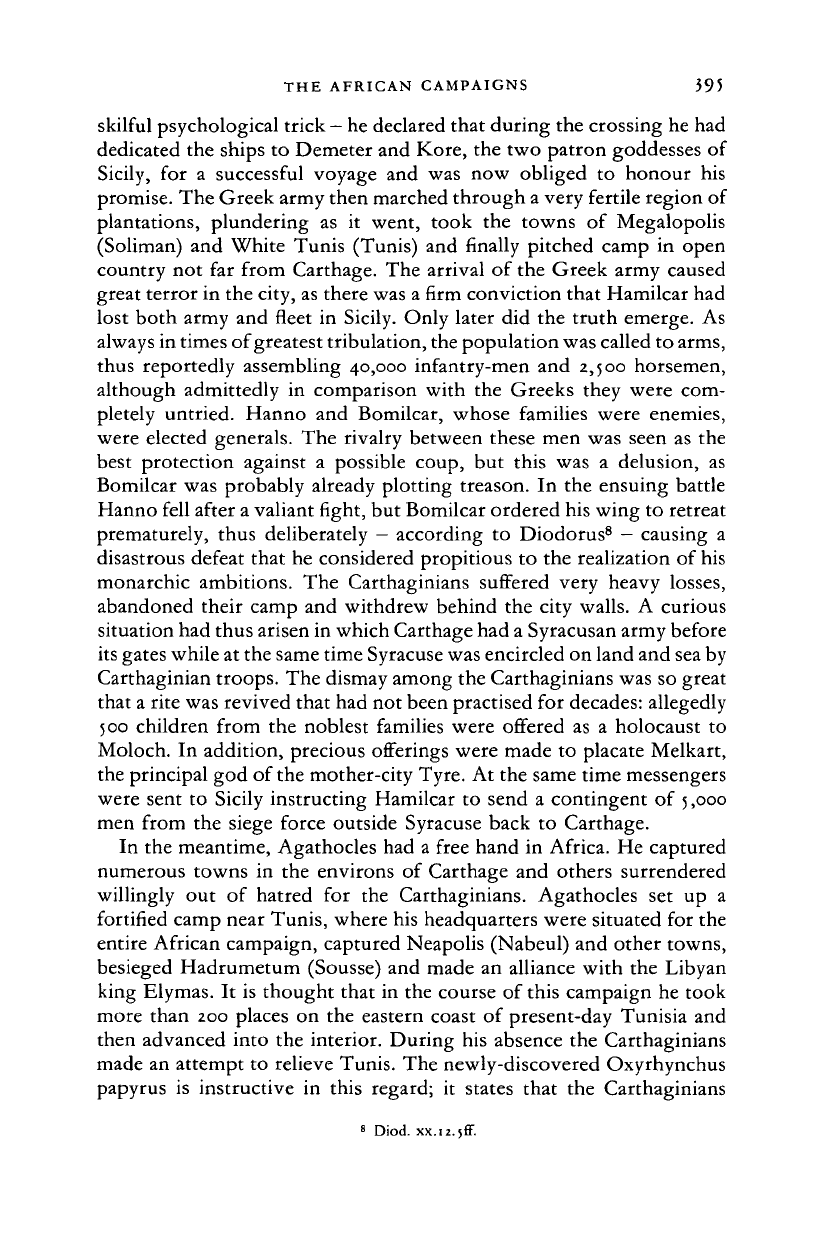
THE AFRICAN CAMPAIGNS 395
skilful psychological trick
—
he declared that during the crossing he had
dedicated the ships to Demeter and Kore, the two patron goddesses of
Sicily, for a successful voyage and was now obliged to honour his
promise. The Greek army then marched through a very fertile region of
plantations, plundering as it went, took the towns of Megalopolis
(Soliman) and White Tunis (Tunis) and finally pitched camp in open
country not far from Carthage. The arrival of the Greek army caused
great terror in the city, as there was a firm conviction that Hamilcar had
lost both army and fleet in Sicily. Only later did the truth emerge. As
always in times of greatest tribulation, the population was called to arms,
thus reportedly assembling 40,000 infantry-men and z,5oo horsemen,
although admittedly in comparison with the Greeks they were com-
pletely untried. Hanno and Bomilcar, whose families were enemies,
were elected generals. The rivalry between these men was seen as the
best protection against a possible coup, but this was a delusion, as
Bomilcar was probably already plotting treason. In the ensuing battle
Hanno fell after a valiant fight, but Bomilcar ordered his wing to retreat
prematurely, thus deliberately
—
according to Diodorus
8
—
causing a
disastrous defeat that he considered propitious to the realization of his
monarchic ambitions. The Carthaginians suffered very heavy losses,
abandoned their camp and withdrew behind the city walls. A curious
situation had thus arisen in which Carthage had a Syracusan army before
its gates while at the same time Syracuse was encircled on land and sea by
Carthaginian troops. The dismay among the Carthaginians was so great
that a rite was revived that had not been practised for decades: allegedly
500 children from the noblest families were offered as a holocaust to
Moloch. In addition, precious offerings were made to placate Melkart,
the principal god of the mother-city Tyre. At the same time messengers
were sent to Sicily instructing Hamilcar to send a contingent of
5,000
men from the siege force outside Syracuse back to Carthage.
In the meantime, Agathocles had a free hand in Africa. He captured
numerous towns in the environs of Carthage and others surrendered
willingly out of hatred for the Carthaginians. Agathocles set up a
fortified camp near Tunis, where his headquarters were situated for the
entire African campaign, captured Neapolis (Nabeul) and other towns,
besieged Hadrumetum (Sousse) and made an alliance with the Libyan
king Elymas. It is thought that in the course of this campaign he took
more than 200 places on the eastern coast of present-day Tunisia and
then advanced into the interior. During his absence the Carthaginians
made an attempt to relieve Tunis. The newly-discovered Oxyrhynchus
papyrus is instructive in this regard; it states that the Carthaginians
8
Diod. xx.12.5flF.
Cambridge Histories Online © Cambridge University Press, 2008
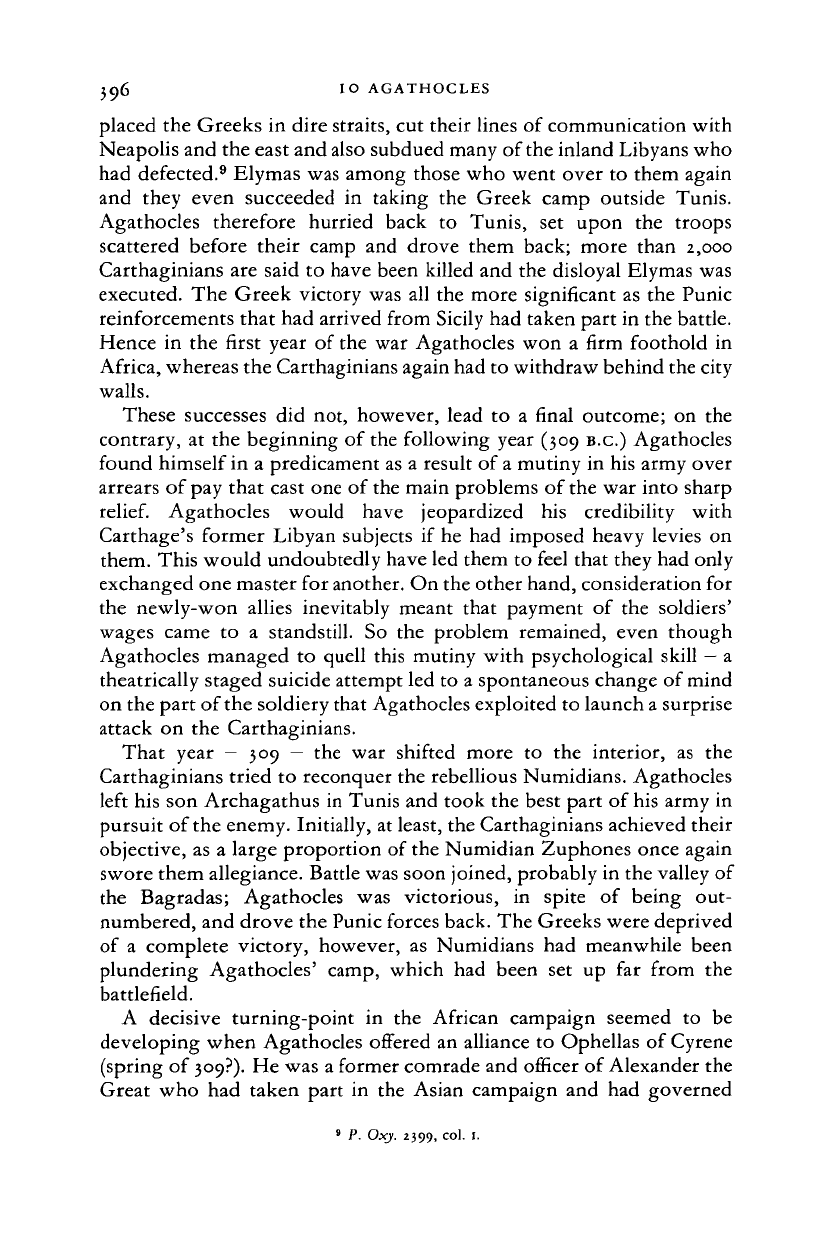
396 IO AGATHOCLES
placed the Greeks in dire straits, cut their lines of communication with
Neapolis and the east and also subdued many of the inland Libyans who
had defected.
9
Elymas was among those who went over to them again
and they even succeeded in taking the Greek camp outside Tunis.
Agathocles therefore hurried back to Tunis, set upon the troops
scattered before their camp and drove them back; more than 2,000
Carthaginians are said to have been killed and the disloyal Elymas was
executed. The Greek victory was all the more significant as the Punic
reinforcements that had arrived from Sicily had taken part in the battle.
Hence in the first year of the war Agathocles won a firm foothold in
Africa, whereas the Carthaginians again had to withdraw behind the city
walls.
These successes did not, however, lead to a final outcome; on the
contrary, at the beginning of the following year (309 B.C.) Agathocles
found himself in a predicament as a result of a mutiny in his army over
arrears of pay that cast one of the main problems of the war into sharp
relief.
Agathocles would have jeopardized his credibility with
Carthage's former Libyan subjects if he had imposed heavy levies on
them. This would undoubtedly have led them to feel that they had only
exchanged one master for another. On the other hand, consideration for
the newly-won allies inevitably meant that payment of the soldiers'
wages came to a standstill. So the problem remained, even though
Agathocles managed to quell this mutiny with psychological skill
—
a
theatrically staged suicide attempt led to a spontaneous change of mind
on the part of the soldiery that Agathocles exploited to launch a surprise
attack on the Carthaginians.
That year - 309 - the war shifted more to the interior, as the
Carthaginians tried to reconquer the rebellious Numidians. Agathocles
left his son Archagathus in Tunis and took the best part of his army in
pursuit of the enemy. Initially, at least, the Carthaginians achieved their
objective, as a large proportion of the Numidian Zuphones once again
swore them allegiance. Battle was soon joined, probably in the valley of
the Bagradas; Agathocles was victorious, in spite of being out-
numbered, and drove the Punic forces back. The Greeks were deprived
of a complete victory, however, as Numidians had meanwhile been
plundering Agathocles' camp, which had been set up far from the
battlefield.
A decisive turning-point in the African campaign seemed to be
developing when Agathocles offered an alliance to Ophelias of Cyrene
(spring of
309?).
He was a former comrade and officer of Alexander the
Great who had taken part in the Asian campaign and had governed
9
P. Oxy. 2599, col. 1.
Cambridge Histories Online © Cambridge University Press, 2008
